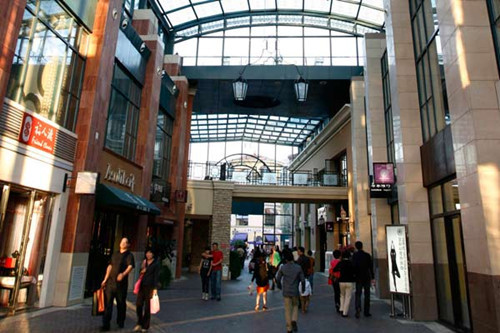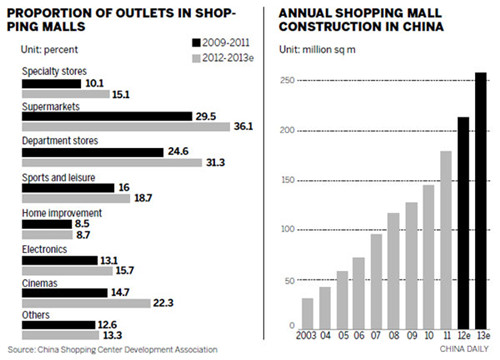
According to experts, China now has 2,812 shopping malls, a number that is likely to exceed 7,000 by 2025. Of the existing malls in China, 80 percent are considered to be large, meaning they have between 50,000 and 100,000-plus square meters of floor space. Provided to China Daily

Nation likely to have more than 7,000 malls by 2025, says expert
As China rises, so do many shopping malls in the country.
Last year, 15 million square meters of floor space for at least 1,500 malls were under construction in China.
"And that's just about enough," said Guo Zengli, president of the China Shopping Center Development Association. "It's enough of the large and trendy malls we see in megacities such as Beijing and Shanghai."
The number of malls being built last year in China far exceeded the figure for Western Europe, where only five were being built in 2011, according to the US-based CBRE Group Inc, a commercial real estate services company.
China now has 2,812 shopping malls, a number that is likely to exceed 7,000 by 2025, Guo said.
According to CBRE data, eight Chinese cities are among the top 10 cities in the world with the largest number of new shopping malls.
Of the existing malls in China, 80 percent are considered to be large, meaning they have between 50,000 and 100,000-plus square meters of floor space.
In the US, only 20 percent of malls fall within those dimensions, Guo said.
Most Chinese malls are aimed at buyers of medium-priced and relatively high-priced goods. They tend to offer the same brands as each other and fail to meet the shopping needs of the general public.
"The kind of shopping centers that most people need are the ones meant for the bottom of the pyramid," he said, meaning those that serve "ordinary people" who "don't want to spend lots of money but lead a decent life".
James Hawkey, executive director of retail services for Cushman & Wakefield China, a subsidiary of a US-based commercial real estate services firm, said few shopping centers in Europe and the US occupy more than 100,000 square meters of space.
Guo said one source of trouble lies in Chinese shopping malls' geographical distribution.
He cited Shanghai for being better than most places at designing the centers and making sure large malls are both spread throughout the city and supported by a network of smaller shops.
In contrast, Beijing and many other cities lack a comprehensive plan for commercial operations.
Some cities are not suited to the construction of large shopping malls. But local governments often go ahead with building projects anyway.
As a result, many recent projects undertaken to renovate old commercial districts in Chinese cities have been failures, especially in their mixing of new designs with traditional settings, Guo said. Those misguided attempts have both destroyed cultural treasures and repulsed long-standing customers, Guo said.
Third- and fourth-tier cities do have a need for shopping centers. Still, such places should be smaller than shopping centers in megacities.
"I would say 50,000 square meters (of floor space) is quite enough," Guo said. "Both those cities' population density and purchasing power are relatively small."
At a time when online retailers are increasingly taking business away from physical stores, malls should try even harder to differentiate themselves by building a solid position in their own markets, taking advantage of their strengths and improving their customer service.
Guo said shopping malls should pay more attention to their customers' experiences and try to not only sell them goods but also provide meals, movies and comfortable settings. Some mall managers have already done this by devising a variety of weekend offerings for customers and their families, Guo said.
"Who can take away your sales if you can draw in entire families?"

Copyright ©1999-2011 Chinanews.com. All rights reserved.
Reproduction in whole or in part without permission is prohibited.